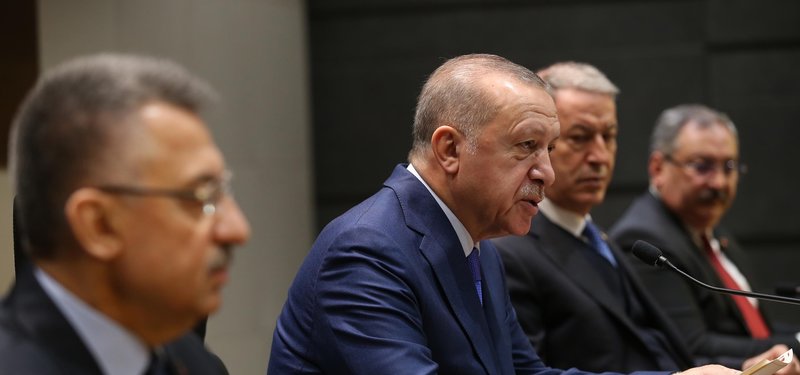
Turkey key to Libya peace with deeds in field, diplomacy
- Türkiye
- Anadolu Agency
- Published Date: 03:22 | 19 January 2020
- Modified Date: 03:22 | 19 January 2020
With its efforts in field and diplomatic area, Turkey has assumed the key role to bring peace to Libya, President Recep Tayyip Erdoğan said on Sunday.
"We highlighted in every occasion that a permanent solution in Libya can be ensured via political dialogue … We cemented our cooperation with the legitimate Libyan government via two memorandum of understandings signed at the end of 2019.
"Turkey has become a key to peace in Libya with its efforts both in field and diplomacy," Erdoğan told reporters in Istanbul.
His remarks came before leaving Ataturk Airport for Germany to attend the international Berlin conference on Libya peace.
German Chancellor Angela Merkel and UN Secretary-General Antonio Guterres will co-host the Berlin conference, which will seek a stronger commitment from the world powers and regional actors to non-interference in Libya, to genuinely support the cease-fire and adhere to the UN's arms embargo.
BERLIN SUMMIT, HOPE FOR SOLID DEVELOPMENTS
Erdoğan underscored that the Berlin conference is a particularly important step to "strengthen the cease-fire and toward the political solution."
"Hopes that has sprouted with the cease-fire and the Berlin summit should not be sacrificed to the ambitions of merchants of blood and chaos," he said.
Erdoğan voiced hope that decisions to be taken in the summit will pave the way for solid developments in various areas from security to economy.
On the other hand, Turkish president criticized international community for not showing the necessary reaction against "reckless attacks of Haftar."
"Actions of putschist [Khalifa] Haftar and his supporters, which has openly been violating UN Security Council resolutions, has long been ignored," Erdoğan said.
However, Turkey has maintained a principled and consistent stance against the crisis in Libya since the first day it started, the president said.
Along with Erdoğan, Russian President Vladimir Putin, French leader Emmanuel Macron, British PM Boris Johnson, Italian Premier Giuseppe Conte, and U.S. Secretary of State Mike Pompeo confirmed their attendance.
The German government also announced that both Libya's Prime Minister Fayez al-Sarraj and the eastern-based commander Haftar accepted invitations for the conference.
Top officials from Egypt and UAE, main supporters of the Libyan warlord Haftar, will also take part in the conference.
HAFTAR'S VISIT TO GREECE AHEAD OF BERLIN SUMMIT
Asked for his comments on Haftar's visit to Greece on Friday, Erdoğan said Greece is in "serious discomfort" for not having been invited to Germany.
His visit count for nothing for Turkey, the president said.
"However, [Greek Premier Kiriakos] Mitsotakis plays the game wrong, his steps are not right, and he did not start the process well," he stressed.
During his visit ahead of Berlin conference, Haftar met with top Greek officials, including Mitsotakis and Greek Foreign Minister Nikos Dendias.
Mitsotakis said late Thursday that they would veto "any political solution" to the conflict in Libya on the EU Council level if the Turkish-Libyan treaties are not canceled.
The Greek PM also expressed his discomfort over not being invited to the Berlin conference on Libya.
ERDOĞAN TO RAISE IDLIB IN BERLIN CONFERENCE
Erdoğan stressed that Bashar al-Assad regime and allies continue their attacks in Idlib, a de-escalation zone in northwestern Syria, despite the cease-fire brokered by Turkey and Russia.
"It is now time to say stop to the brutality of the regime. We will also raise the Idlib issue during our contacts in Berlin," Erdoğan added.
Turkey announced on Jan. 10 that a new cease-fire in Idlib rocked by violence -- though "acts of aggression" are already officially banned -- is set to start just after midnight on Sunday, Jan. 12.
Separately a day earlier, Russia's Defense Ministry announced a cease-fire in the region taking effect at 2.00 p.m. local time (1200GMT).
However, the regime and Iran-backed terrorist groups continued their ground attacks despite the fresh cease-fire.
Turkey pushed hard for a cease-fire in Idlib after the region endured months of battering by forces loyal to the Bashar al-Assad regime and its allies, sending about a million civilian refugees flocking towards the Turkish border.
Also, Turkey and Russia agreed in September 2018 to turn Idlib into a de-escalation zone in which acts of aggression are expressly prohibited.
However, more than 1,300 civilians there have been killed in attacks by the regime and Russian forces since then, as the cease-fire continued to be violated.
More than one million Syrians have moved near the Turkish border due to intense attacks over the last year.
- Libya conference in Berlin agrees on cease-fire plan
- Turkey-US trade ties remain stable during Trump presidency despite political tensions
- Flagship carrier THY sees all-time high for female employment with 211 women pilots
- Work starts on high-speed metro to Istanbul Airport
- Turkey condemns EU statement on drilling in Eastern Med

